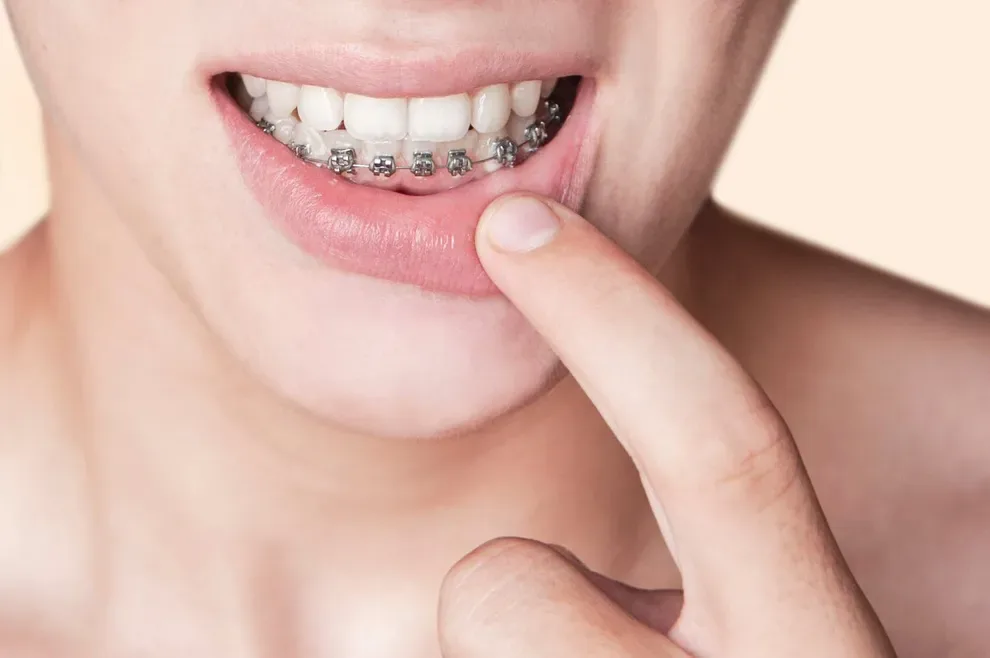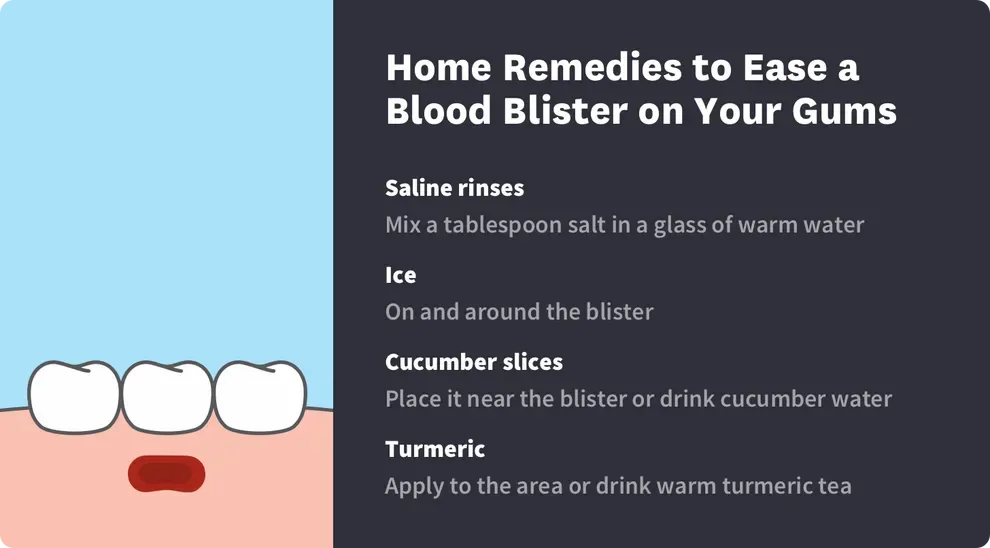How to Safely Manage a Blood Blister on Your Gums

Table of Contents
- Why Did a Blood Blister Appear on My Gums?
- Blood Blister on Gums
- What to Do With a Blood Blister
- When to Get Treatment
- Home Treatment
- Getting Treatment
Blood blisters are a common occurrence and typically harmless, although they may be startling when they appear in your mouth or on your gums. These usually appear randomly, for no reason, and will go away on their own.
Accidentally hurting your gums in some way might cause one to appear. Being under a lot of stress or having an allergic reaction might also cause one.
What is a blood blister on gums?
A blood blister is a pocket of skin that holds a big bubble of blood. Since the blood is very close to the surface of the skin, the blister looks dark red or purple (just like blood).
Some blood blisters are very small and hard to see, while others are quite large. In severe cases, blood blisters can make it hard for you to eat or talk.
The most common type of blood blister (angina bullosa hemorrhagica) typically appears on the soft palate, tongue, gingiva, and the side of the mouth. Blood blisters caused by other factors (like trauma) can appear in other places.
Do not pop blood blisters. This increases the risk of infection. If a blood blister grows larger, does not go away, or keeps coming back, talk to your dentist.
Why Did a Blood Blister Appear on My Gums?
The most likely reason you develop a blood blister on your gums is simple: There is no known cause, and it is harmless. However, there might be a reason the blood blister appears on your gums, including the following:
Accidental injury, from hitting your face, poking your gums, or even just eating crunchy food
Eating something too hot that scalds your mouth
Experiencing high stress
Having an allergic reaction
Poorly fitting dental appliances, such as clear plastic aligners or dentures
Blood blisters typically go away on their own. But if you have consistent, recurring, or chronic blood blisters, there may be an underlying health reason causing them to continually appear. This might include the following:
Renal (kidney) failure
Oral herpes (herpes simplex virus I)
Substance abuse, especially alcohol or tobacco use
Low platelet count due to a blood clotting disorder
Vitamin deficiencies
Diabetes
Immune disorders
Oral cancer
If you are concerned about a blood blister that does not go away, recurring blood blisters, blood blisters that occur after an accident, or blood blisters alongside other symptoms like pain in your gums, talk to your dentist to get a diagnosis.
What to do when you spot a blood blister
When you see a blood blister for the first time, you may be frightened. You may want to make it go away as quickly as possible.
As much as you’re tempted to do so, don’t pop the blister. Instead, take these steps:
Measure the size of the blister (so you’ll know if it gets bigger).
Call your dentist and tell them what happened.
Brush your teeth normally, but be careful not to touch the blister.
Monitor the blister and contact your dentist immediately if everything goes wrong.
When should you get treatment for a blood blister on gums
Some types of blood blisters go away without treatment, but others are more serious. While it’s smart to ask your dentist about any blisters that make you uncomfortable, some conditions require a professional’s help.
If you experience these symptoms, contact your dentist:
Blisters that last for three weeks or longer without resolving
Blisters that go away and come back again
Blisters that are very large
Blisters that are near the back of your throat
Blisters that are painful or dark red
Home treatment to ease blood blisters while they heal

You might feel impatient while you wait for an unsightly or uncomfortable blood blister on your gums to go away, but it is important not to pop or squeeze a blister, including a benign blood blister. Damaging your gums in this way can lead to gum disease and harm your oral health.
Take these self-care steps instead to help your mouth heal:
Rinse with saline. Place a tablespoon of salt in a glass of warm water and swish the solution around for a minute or two. Researchers say saline can help damaged oral tissues to heal.
Apply ice. Ice can reduce inflammation, swelling, or the feeling of heat if the blood blister has an associated infection. Wet a towel with cold water, fold it into a plastic bag, and freeze it for 15 minutes. Apply it to the sore area for 10 minutes once an hour for the first 72 hours after you spot the blister.
Use cucumber. Cucumber slices, which contain silica, promote skin regeneration and healing. This is why they are applied in spas. Place a cucumber slice near the blood blister on your gum for relief, or drink cucumber water.
Try turmeric. Apply a little turmeric to the area, or drink a warm (not hot) turmeric tea. This can help to reduce inflammation and remove some harmful bacteria. Researchers say turmeric can work as an anti-inflammatory, too. It’s not toxic at large doses, so you can use it as often as you’d like to.
Drink chamomile tea. Chamomile has been used for inflammation and ulcers for decades. Researchers say it’s an effective therapeutic agent, especially in tea. Prepare tea and let it cool. Sip and swish to put it in contact with the blister.
You should also avoid:
Spicy, pepper, salty, or acidic food, which can irritate the area.
Crunchy or hard food, which can cause pain to the area.
Placing clear aligners or dentures on the gums until the blister heals.
Getting dental & medical treatment for blood blisters
Recurring, large, painful or infected, or stubborn blood blisters require medical attention to determine their underlying cause. Visit your dentist if you have any concerns. Once the dentist examines the blister, they can refer you to a doctor for diagnosis and treatment if the blister appears to be related to diabetes, cancer, herpes, or another condition. This ensures you get proper medical treatment to improve your overall health, including your oral health.
It's most likely that the blood blister is simply the result of stress, pressure on the gums, injury to the gums, or random chance. If you think the blister came from poorly fitting dental devices, talk to your dentist to have them refit.
You want your smile to be its best, but you must make sure your teeth aligners fit your teeth and mouth properly. Follow any instructions you receive from your dentist and from the company where you purchased your clear aligners. Removing sources of irritation allows the blister to heal.
